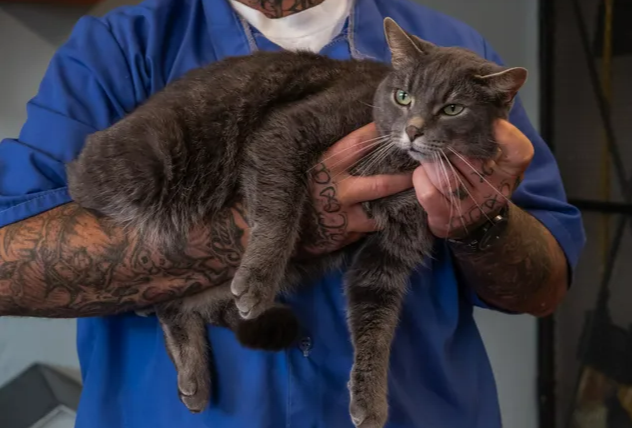Finding Redemption with Prison Cats
Cats, incarcerated people rehabilitate each other through animal care programs

Cats live in every imaginable environment. As long as they can eat and sleep in peace, you’ll find them in a variety of places, including correctional institutions, jails, and prisons. Though they aren’t serving time, community cats living on prison grounds are often locked in their own challenging situation. Many prisons consider trapping and moving them to shelters, where almost all would be killed.
Responding to this, many animal control and humane society organization across the country are establishing programs to match stray cats and kittens with incarcerated people, where both get to find redemption through caring for each other.
Cats can’t judge men and women on their wrongdoings (as any cat owner knows, they judge all humans the same). They cannot gauge the gravity of crime, and cannot judge the ink on people’s skin.
Prison pet programs started in the 1980s as a way to decrease recidivism, or the rate at which released inmates reoffend. The programs started with a primary focus on dogs, but have since grown to include cats and in some cases, even horses.
Monica Solinas-Saunders, an associate professor at Indiana University whose research focuses on incarceration and offender rehabilitation, said these types of programs have shown significant improvements in recidivism rates –– and on inmates’ soft skills, or the personal attributes that help people navigate their environment.
“The evidence from the research shows these pet programs actually have a fantastic effect on increased personal responsibility for offenders,” Solinas-Saunders said. “It increases self-esteem and self-efficacy. It also increases empathy, which is something we are really appreciating these days, in terms of understanding each other’s pain.”
Beyond that, pet programs have resulted in improved relationships within the facility, between the involved offenders and other incarcerated individuals, and between offenders and the staff and administrators –– which is exactly the intended outcome of programs aimed toward rehabilitation.
Studies on prison pet programs have also shown increased emotional intelligence and coping skills, she said, as well as improved work ethic and employability, which improve the chances of job readiness and are critical factors in successfully re-entering society and reducing recidivism.
Maleah Stringer, Director of the Animal Protection League of Indiana, said about the F.O.R.W.A.R.D. (Felines and Offenders Rehabilitation with Affection, Reformation and Dedication) program, "I've had offenders tell me when they got an animal, it was the first time they can remember they were allowing themselves to care about something, to love something. That's a pretty powerful statement."
Examples of some of these programs across the country:
- Alley Cat Allies (New Jersey): TNR (Trap and Release) program with Bayside State Prison and Southern State Correctional Facility
- Jail Cats/Gwinnett County Sheriff’s Department (Georgia): Rescues kittens from the local Animal Care and Control center go into a female jail where incarcerated women volunteer with helping to socialize the kittens.
- Animal Protection League of Indiana/F.O.R.W.A.R.D. (Felines and Offenders Rehabilitation with Affection, Reformation and Dedication): A dozen cats and screened incarcerated persons are provided with a large room of their own where care, feeding, and grooming take place.
- Meow/Mutt Mates/Allendale Correctional Institution (South Carolina): chosen residents in the Character-based Housing Unit (CHU) are paired with a dog or cat from the shelter.
You can also watch noted cat whisperer Jackson Galaxy visit the Allendale/Meow Mates program on the Animal Planet Youtube channel.
=^oo^=










